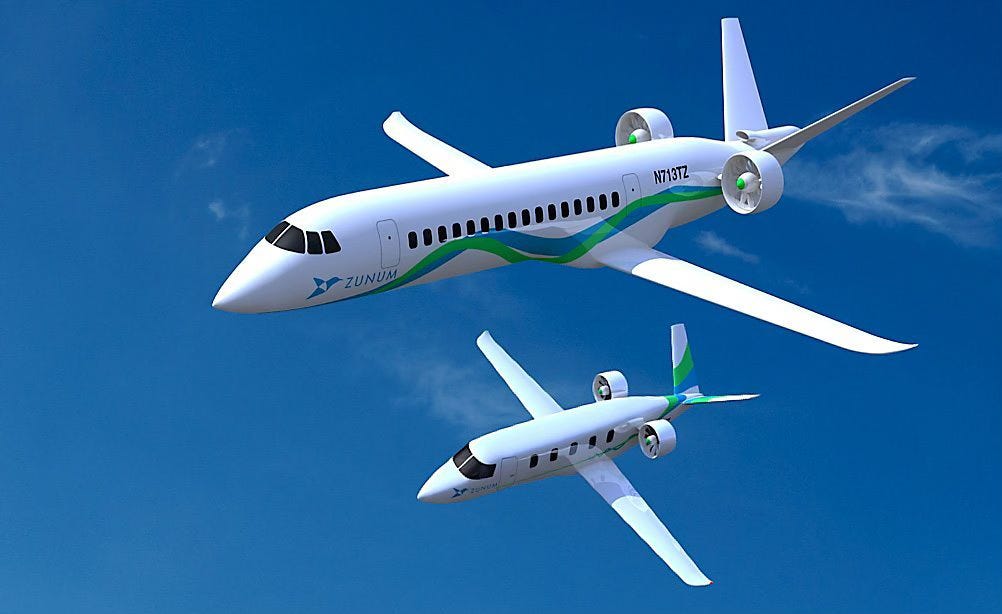It’s a requirement that mainstream media tell us how wonderful the world will be once we get rid of all that nasty carbon-based fuel, and it continued in a report on the CBS Sunday Morning show last weekend. Science reporter David Pogue investigated the startups aiming to produce the first FAA-approved electric airplane.
The planes look sleek, avoiding those huge engine nacelles on regular planes that produce all that nasty exhaust. They are so quiet in operation, Pogue says, that you can hear the wind passing over the plane’s fuselage as you fly. Many of the planes will not even need runways, using tilting motors and props to take off and land vertically, like a helicopter.
So what are the drawbacks? Pogue admits that range is a problem, just as it is for battery-powered cars. One business has a plane that can go 250 miles before needing to be recharged. That’s okay for a car but just a puddle-jump for an airplane, the whole idea of which is to go farther in much less time than driving.
What isn’t mentioned in the report is the really bad news, which is that electric airplanes would condemn us to the commuting speeds of the 1950s. We have become so accustomed to jet airliners that we miss the obvious: you can’t make an electric jet. Jets get us where we want to go fast because they literally set fire to huge amounts of flammable fuel that is then constrained to shoot out the back of the engine, producing the thrust that makes the airplane move. It is so powerful that planes can travel well past the speed of sound using jets.
But electric motors turn propellors, which takes us right back to the 1940s, when propellor-driven planes were used in World War Two. Those planes couldn’t go much faster than 400 miles an hour because the props acted like big fans to produce wind and pull the plane forward. A jet’s thrust works directly backward to make the plane go fast, but the propellors have to go around sideways so the speed of the plane never matches the speed of the propellor turning. When the tips of the propellor blades start to approach the speed of sound themselves, bad things happen and limits are reached. No prop plane ever broke the sound barrier because the plane itself broke first. As Wikipedia notes drily, “Shock wave formation in propeller-driven aircraft at speeds near sonic conditions, impose limits not encountered in jet aircraft.”
Sadly, the speed of jetliners themselves has been dropping ever since the 1960s. Back then the Boeing 707s would travel almost 600 miles an hour to get us where we were going, but the fuel price shocks of the 1970s made the planes slow down to save money. Complaints about noise around airports forced airlines to use high-bypass turbojets that weren’t much more than propellor-driven themselves, using big fans in the engines to provide much of the thrust. Nowadays airliners fly in the 400-450 mile per hour range. Dallas to New York, once less than a three hour trip, now takes three and a half, averaging about 450 miles an hour nonstop.
We have redefined progress and that’s not a good thing. Replacing jets with electric-powered prop planes is almost literally reinventing the wheel. We take an advanced technology and, using other advanced technology, produce something that we tell ourselves is better, but is slower and requires more resources.
It’s not just transportation. In the 1950s the Salk and Sabin polio vaccines produced almost complete immunity against the viral disease that lasted for the life of the patient. The recent Covid pandemic required an equally effective vaccine and we got something that sort-of worked most of the time and had serious side effects. Even war is affected; Russia invades Ukraine two and a half years ago and it soon devolves into trenches and artillery exchanges that a World War One veteran would find familiar. What did we do in the century in between, he would wonder.
People think they can define progress to suit themselves, but it remains a matter of doing things faster, better and cheaper. When we stop doing that, we start to fall backward, like a rocket that’s run out of fuel. When Rome stopped making progress, the Middle Ages resulted, with their wars, plagues and occasional starvation. Don’t think it couldn’t happen again.



Always insightful.
Thank you.